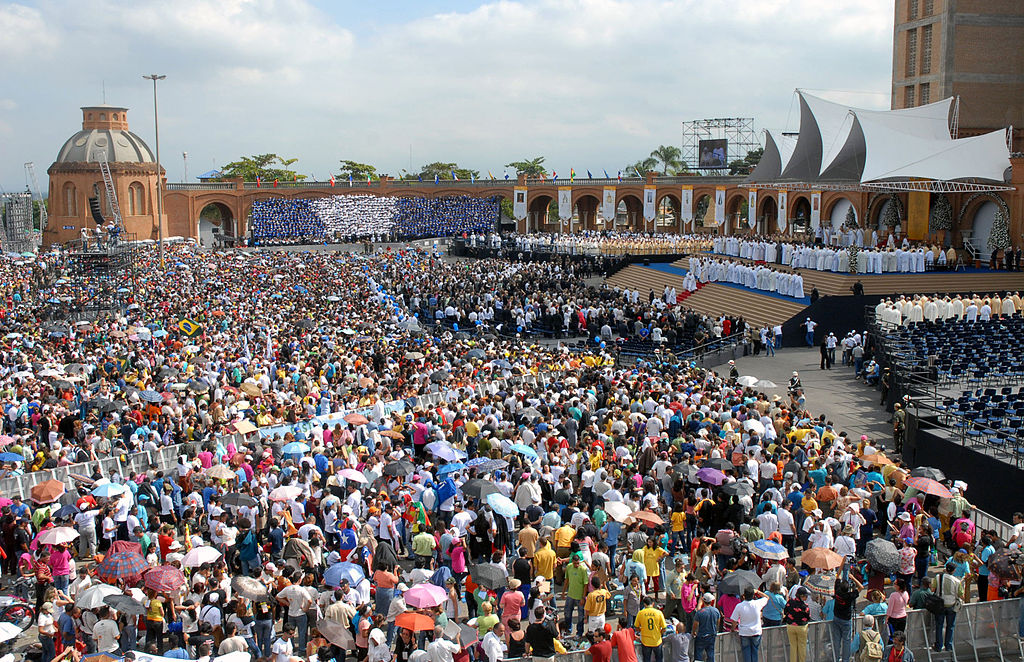John Stuart Mill was a prominent public intellectual of the Victorian era. A popular figure in liberal circles, Mill wrote about economics, politics, and society. One of his contemporaries in London was Karl Marx. Marx lived in London at the same time as Stuart Mill did and, according to the historian Gertrude Himmelfarb, the two intellectuals never met despite many overlaps in their works.
Successive generations tried to turn Marx into a kind of prophet. Many Western intellectuals continue to overlook the many errors of his economic theory and, philosophy of history, ignoring the disastrous results when his ideas were put into practice.
Another place where Marxism remains strong is among some progressive Catholic clergy in Brazil. The good news is that Marxist influence via liberation theology is much less significant than it was in the past. As the Cardinal Archbishop of Sao Paulo Dom Odilo Scherer puts it, from an intellectual point of view, Christian Marxism is dead. Nevertheless, Brazilian Catholics continue to live under its shadow.
The pontificate of Pope Benedict XVI significantly strengthened the proliferation of a vibrant orthodox Catholicism decisively. Notwithstanding the still strong progressive outlook within the older ranks of the Brazilian Catholic clergy, we have witnessed a resurgence of Catholic conservatism in the last two decades.
Many people will be familiar with orthodox Catholic organizations such as Opus Dei and Communion and Liberation. Less well-known are groups like the Heralds of the Gospel, the Plinio Correa de Oliveira Institute (PCOI), the Monfort Association, the Flos Carmeli Studies, the Good Shepherd Institute, the Apostolic Administration of St. John Mary Vianney (AASJMV), the think-thank Permanency and, especially, the Don Bosco Center.
The oldest of these conservative Catholic organizations was the Brazilian Society for the Defense of Tradition, Family, and Property (TFP) founded by Plinio Correa de Oliveira in 1960. His death in 1996 led to the group’s falling out and the creation of two different organizations: PCOI and the Heralds of the Gospel. The Heralds were created by Monsignor Joao Scognamiglio Clá Dias while the PCOI was created by Correa de Oliveira’s cousin, Adolpho Lindenberg. Both groups share a conservative outlook.
The Monfort Cultural Association was founded in 1983 by Orlando Fedeli. Some of his disciples created the Flos Carmeli Studies: a conservative Catholic think-thank which promotes the dissemination of Catholic thought and especially Catholicism’s long history of opposition to leftism. As for the Good Shepherd Institute, its establishment was approved in 2006 by Pope Benedict XVI with the mission to promote the Tridentine Mass, which has experienced growing popularity with the Brazilian laity.
The Apostolic Administration of St. John Mary Vianney is another excellent example of the consolidation of conservative Catholicism in Brazil. This group emerged from a group of priests and laity from the diocese of Campos that had formed the Union of St. John Mary Vianney, founded by the Bishop Emeritus of the diocese, Dom Antonio de Castro Mayer, in 1981, whose purpose was the celebration of the Mass of Pius V.
The Brazilian Catholic writer Gustavo Corção founded the think-thank Permanency in the late 1960s in response to the spread of progressive and liberationist positions aiming the Brazilian Catholic clergy. After the death of Corção in 1978, the organization went through a process of decay, but the growing popularity of conservative ideas in Brazil has allowed Permanency to reinvent itself as a publishing house of conservative Catholic books.
The Don Bosco Center may today be the most important Catholic conservative think-tank committed to lay education based on an orthodox conception of Catholic teachings. It has played a significant role in spreading Catholic teaching and translating books of orthodox Catholic writers into Portuguese. One of its most prominent members, Christina Tonietto, was elected congresswoman in the last general election in 2018.
At least two things are especially noteworthy in understanding these conservative Catholic groups. The first is the role of the leader and the second is the relationship of these organizations with the Catholic clergy. The first generation (TFP, Permanency, Monfort, and the AASJMV) arose in response to the advancement of liberation theology and other modes of Christian progressivism. All of them were centered on the figure of their creators (Correa de Oliveira, Corção, Fedeli, and Dom Castro Mayer) and experienced a marked decline after their death. What also stands out is the relative distance of these groups concerning the Brazilian Catholic clergy.
Inverse tendencies characterize the second generation (the Heralds, IPOC, the Flos Carmeli, the Good Shepherd Institute, AASJMV in full communion with Rome, the refunded Permanency and the Don Bosco Center). The figure of the leader was replaced by a more de-centralized hierarchy and adapted to a social reality where the Internet became the central means of the propagation of ideas. The rapprochement between these groups and members of the clergy is also evident. Many prominent figures of modern Brazilian Catholicism have a formal or non-formal association with these groups, including priests and bishops.
Two of these groups – the Good Shepherd Institute and the AASJMV – are Vatican-recognized organizations managed by clergy whose purpose is the education of the laity. Also striking is the youth of their members. Most of them are between 18 and 30, who make up the majority of members of these organizations. This is a generation that has grown up in an environment in which information spread more quickly and decentralized. Above all, they were raised at the moment in which Benedict XVI was the leading theologian of the Catholic Church, and he still enjoys great popularity with the conservative Catholic youth in Brazil.
Many of the politically significant changes which have shaped Brazil over recent years have been shaped and are shaped by these conservative Catholic groups. That includes the last election of the populist candidate Jair Bolsonaro as president of Brazil.
The link between Bolsonaro and conservative Catholics may be overlooked because of the newly elected president’s popularity among evangelicals, but it would be a mistake to deny the connection. The first ones to rebel against the hegemony of the left over the cultural milieu were conservative Catholics. These Catholic groups were also the first ones to understand the power that the Internet has to bypass the control that the big media has on the diffusion of knowledge and information. When Bolsonaro emerged in the Brazilian political scene, he used the channels that had been developed by conservatives to spread his political message. Conservative Catholics were also partly responsible for shifting the political debate toward cultural issues. Moreover, when Bolsonaro had to give an intellectual structure to his political platform, Catholic intellectuals such as Olavo de Carvalho were the ones who helped him.
No doubt, many of these developments owe something to the fact that theological progressivism and liberationist thought have lost the hegemony it enjoyed two decades ago among Catholic clergy and many Catholic laities. The pastoral failures of progressivism and liberationism are very hard to deny. The outlook of orthodox and conservative Catholicism is thus one of optimism. Granted, a change will take time, but it is well underway.
Homepage photo credit: Papa Bento XVI durante missa na Basílica de Nossa Senhora Aparecida, no interior do estado de São Paulo, Brasil. Date:13 May 2007. Author: Valter Campanato/ABr. Wiki Commons.

